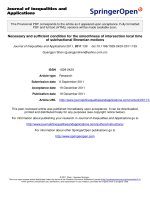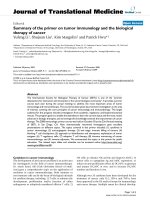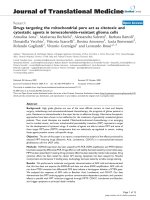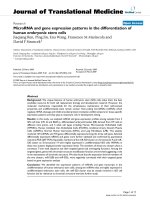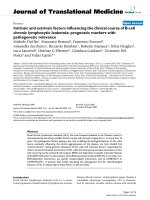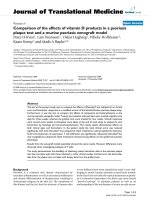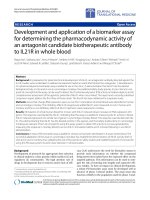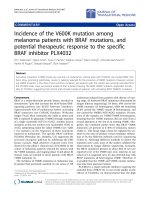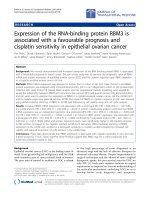báo cáo hóa học:" eJIAS and the Bristol-Myers Squibb Foundation''''s Secure the Future Program" potx
Bạn đang xem bản rút gọn của tài liệu. Xem và tải ngay bản đầy đủ của tài liệu tại đây (131.6 KB, 1 trang )
BioMed Central
Page 1 of 1
(page number not for citation purposes)
Journal of the International AIDS Society
Open Access
Editorial article
eJIAS and the Bristol-Myers Squibb Foundation's Secure the Future
Program
John Damonti
Address: President, Bristol-Myers Squibb Foundation, New York, NY
Secure the Future, Bristol-Myers Squibb's landmark $115
million program to offer care and support for the women
and children affected and infected by HIV/AIDS in 9
countries in Southern and Western Africa, recently
marked its 5-year anniversary. During that time it has sup-
ported nearly 200 programs in these countries to offer
new approaches to medical research and care and com-
munity outreach and education, especially in resource-
limited settings. These projects have included new studies
focusing on mother-to-child transmission of HIV after
birth, the development of CD4 tests that have reduced
costs by up to 80%, the first HIV reference laboratory for
HIV diagnosis and testing in Botswana, the first pediatric
HIV/AIDS treatment and research center in Africa, and a
groundbreaking healthcare training curriculum in HIV/
AIDS, along with scores of projects supporting home-
based care, counseling, prevention, destigmatization and
education, income generation, nutritional support, and
much more. In each project, the aim has been to find ways
to create sustainable solutions that are appropriate for
each setting and to do so in ways that build capacity for
the future in each of these areas. Secure the Future recently
opened a series of comprehensive community-based
treatment and support centers to serve as model programs
through which newly available antiretroviral treatments
can be delivered, while at the same time offering the kind
of community-based support and resources, from coun-
seling to home-based care, that will be required if these
treatments are to truly succeed.
In doing all of this, we have learned the critical impor-
tance of sharing learnings and extending the reach of these
programs through partnerships and communications
efforts. That is why we believe that supporting eJIAS: eJour-
nal of the International AIDS Society, a groundbreaking
online journal that will allow clinicians and researchers
from developing countries to share their findings and
learn from each other, is so vital. Given the geographies
represented, the difficulties of transportation, language,
and resources, creating new and effective ways for front-
line HIV/AIDS health workers to communicate their
research findings and clinical experiences is not only
appropriate, it is critical. In founding eJIAS, the Interna-
tional AIDS Society has recognized that the HIV/AIDS cri-
sis in Africa and around the world demands new
approaches to how scientific information is disseminated.
The urgency is great, and the needs are even greater, as the
ability of a growing number of researchers and clinicians
to publish without assistance, according to the rules and
requirements of most established medical journals, is
often as limited as their ability to study and respond to the
AIDS pandemic in the resource-restricted settings in
which they work.
In supporting eJIAS with a founding grant, Secure the
Future is making an investment in the future by enabling
physicians and researchers in the developing world to
continue to learn from each other and work together to
make a greater difference in their fight against this terrible
pandemic.
Authors and Disclosures
John Damonti is an employee of Bristol-Myers Squibb.
Published: 8 July 2004
Journal of the International AIDS Society 2004, 6:57
This article is available from: />
